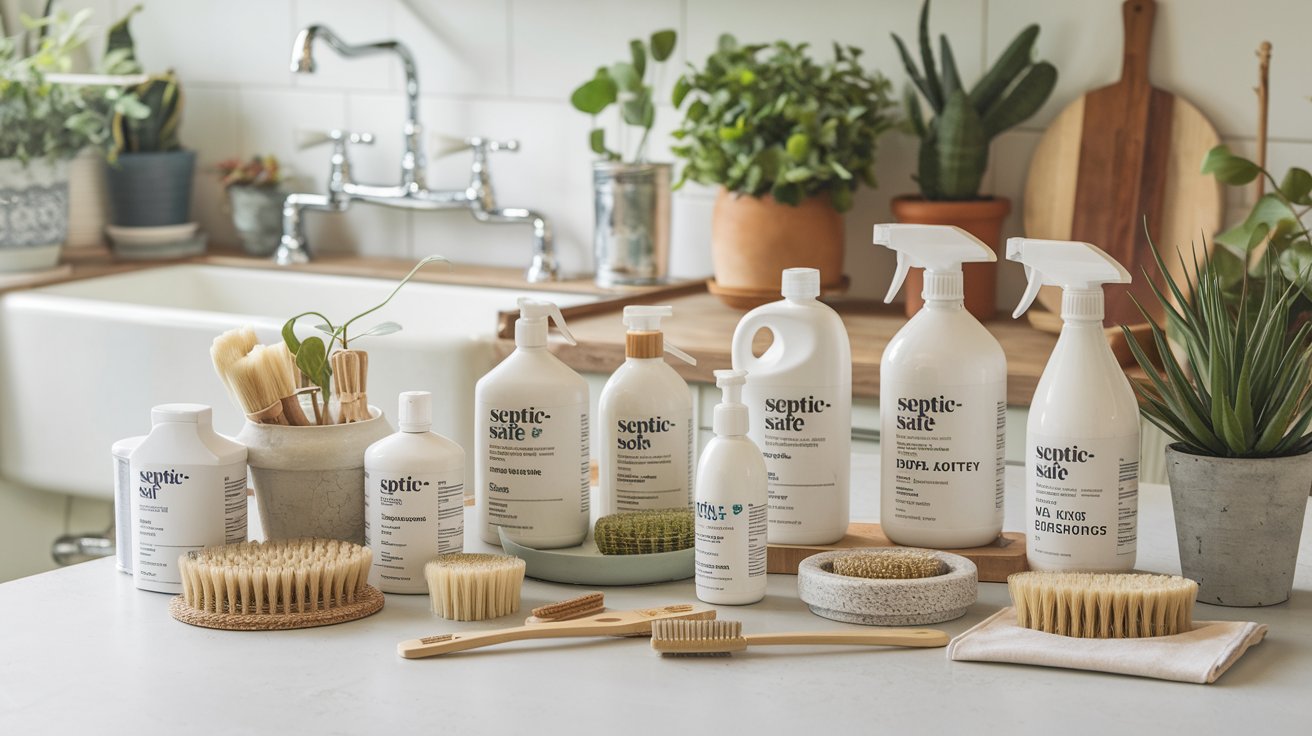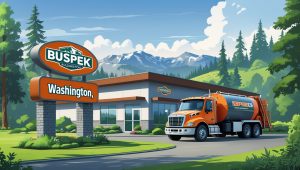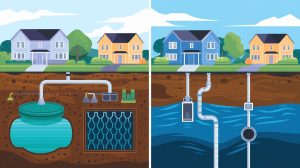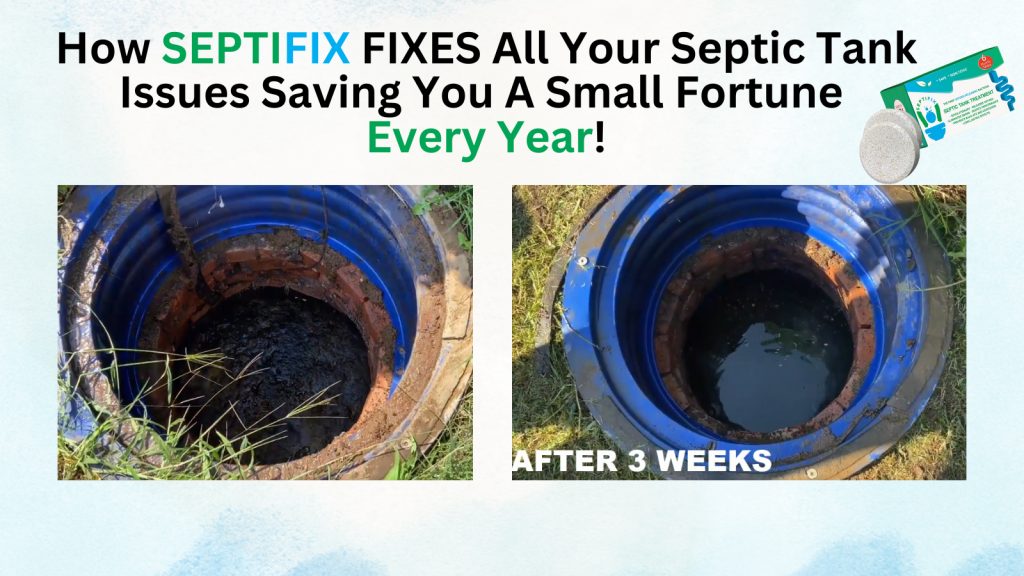When you’re living with a septic system, it’s not just what goes down the drain that matters—it’s how you clean it, too. Choosing the right household cleaners safe for septic systems is crucial to protecting the bacteria that keep your tank working smoothly. Many popular cleaners contain harsh chemicals that can disrupt your septic system’s balance, leading to clogs, odors, or even full-blown system failures.
In this guide, we’ll break down which cleaning products are septic-safe, how to use them wisely, and what to avoid.
Table of Contents
- Why Septic-Safe Cleaning Products Matter
- What to Look for in Septic-Safe Cleaners
- Best Septic-Safe Cleaners by Category
- How to Use Cleaners Safely with Your Septic System
- Products and Ingredients to Avoid
- DIY Alternatives: Natural and Septic-Friendly
- Contact Info and Resources
- Conclusion
- Septifix
- Septic Permit Links by State
Why Septic-Safe Cleaning Products Matter
Conventional cleaners often contain bleach, ammonia, and antibacterial agents—all of which can kill the beneficial microbes in your septic tank. These microbes break down waste and help prevent backups. When they’re destroyed, your system is left vulnerable to solid buildup, clogged drain fields, and contamination risks.
Impact of Harsh Cleaners on Septic Systems
- Kills essential bacteria needed for waste breakdown
- Creates chemical imbalances in your tank
- Increases maintenance frequency and pumping costs
- Can lead to leach field failure, which is costly to repair
To maintain a healthy septic system (sometimes called a private sewage or onsite wastewater system in some areas), it’s important to use products that are both effective and non-disruptive.
What to Look for in Septic-Safe Cleaners
1. Biodegradable Formulas
Choose cleaners labeled biodegradable. These break down naturally and are less likely to interfere with your septic system’s biological processes.
2. Non-Antibacterial Ingredients
Avoid antibacterial or antimicrobial claims. While those may sound appealing, they’re harmful to the beneficial bacteria in your tank.
3. pH-Neutral or Mildly Acidic
Look for products with a neutral pH (around 7). Highly acidic or alkaline cleaners can upset the delicate balance in your tank and potentially corrode your pipes.
4. Minimal Phosphates and Chlorine
High phosphate levels can lead to algae blooms in your drain field, and chlorine can sterilize your tank’s environment. Always opt for low or phosphate-free options.
Best Septic-Safe Cleaners by Category
All-Purpose Cleaners
- Seventh Generation All-Purpose Cleaner – Plant-based and biodegradable
- Better Life Natural All-Purpose Cleaner – Non-toxic and safe for septic use
Toilet Bowl Cleaners
- Ecover Toilet Bowl Cleaner – Septic-friendly and uses natural ingredients
- Green Works Toilet Bowl Cleaner – Uses essential oils and citric acid
Tip: Avoid using bleach or in-tank cleaning tablets. Even “low bleach” options can accumulate and harm your tank’s balance.
Drain Cleaners
- Earthworm Drain Cleaner – Enzyme-based and septic-safe
- Bio-Clean Drain Cleaner – Uses live bacteria to digest waste naturally
Warning: Never use chemical drain openers like Drano in a septic system—they can destroy beneficial microbes and damage your pipes.
Dishwashing Liquids
- Mrs. Meyer’s Dish Soap – Phosphate-free and biodegradable
- ECOS Dishmate Liquid – Plant-powered and septic-safe
Laundry Detergents
- Arm & Hammer Sensitive Skin, Free & Clear – Septic system approved
- Seventh Generation Laundry Detergent – No dyes or artificial brighteners
Use liquid detergents instead of powders. Powdered detergents can clump and contribute to sludge buildup.
How to Use Cleaners Safely with Your Septic System
Avoid Overuse
Even safe products can cause problems in large quantities. Stick to manufacturer-recommended amounts, and avoid excessive rinsing of cleaners into the drain.
Clean in Intervals
Instead of deep cleaning your entire house in one day, spread out your cleaning routines. This helps your tank better manage the incoming water and products.
Use Microbe-Friendly Boosters
If you’re worried about chemical buildup, consider using a septic tank treatment to replenish bacteria. Natural options like Bio-Active or Rid-X can help maintain balance.
Products and Ingredients to Avoid
Some ingredients may seem harmless but are not suitable for a septic system. Always check the label for these red flags:
- Sodium hypochlorite (bleach)
- Quaternary ammonium compounds
- Triclosan or Triclocarban (common in antibacterial soaps)
- Phosphates
- Synthetic fragrances and dyes
Avoid any cleaner that markets itself as “disinfecting” or “sterilizing”, unless explicitly marked as septic-safe.
DIY Alternatives: Natural and Septic-Friendly
If you prefer homemade solutions, there are several safe and effective DIY options.
Vinegar + Baking Soda
A classic combo for cleaning sinks, toilets, and countertops. This mixture deodorizes and breaks down grime without harming septic bacteria.
Lemon Juice + Water
Perfect for cutting through grease and leaving a fresh scent. Use it on windows, faucets, and bathroom surfaces.
Castile Soap
Made from vegetable oils, Castile soap is a gentle, multipurpose cleaner ideal for septic systems.
Contact Info and Resources
For more help maintaining your septic system, check out these resources:
- EPA SepticSmart – Tips on protecting your system
- National Onsite Wastewater Recycling Association (NOWRA) – Septic professional directory
- [Your Local Health Department] – Often provides septic maintenance guides tailored to your area
- Explore related articles on our site:
Conclusion
Choosing household cleaners safe for septic systems isn’t just about being eco-friendly—it’s about protecting your home’s essential plumbing system. Stick with biodegradable, non-toxic products, avoid antibacterial agents, and be mindful of how often and how much cleaner you use. Whether you’re scrubbing toilets or doing laundry, the right products will help your septic tank thrive for years to come.
Take action today—swap out those harsh chemical cleaners for septic-safe alternatives and enjoy peace of mind with every flush and rinse.
DIY Septic Tank Installation: A Complete Guide for Homeowners
Directory | Washington Septic Service Providers | Part 2
Directory | Washington Septic Service Providers | Part 1
DIY Repairs Are Always Cheaper
Septic Regulations in Rural Areas: Essential Guide for Rural Property Owners
The Role of Perforated Pipes in Drain Fields
What Happens During a Pumping Service?
Septic Tanks vs. Sewer Systems | Choosing the Right Option
Septifix










